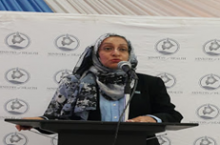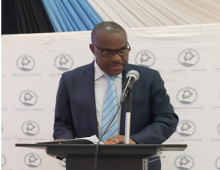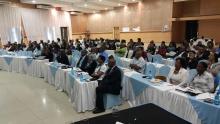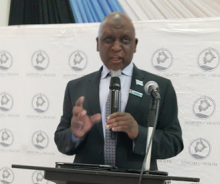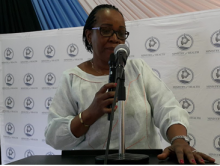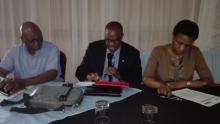Botswana conducts a high level summit to identify ways to accelerate reduction of maternal mortality
Francistown, Botswana, 17 September 2016 -- Concerned by the persistently high maternal deaths despite the high coverage of key maternal mortality reduction interventions (such as antenatal care, skilled birth attendance and postnatal care), the Ministry of Health convened a high level two-day national summit. Stakeholders in attendance, including MOH, DHMTs, all hospitals management and professional bodies, deliberated on the high levels of maternal and newborn mortality and to propose ways and means to accelerate their reduction. The Theme of the summit was: “Make a Mark, Maternal Mortality Is Unacceptably High!”
In her key note address, the Permanent Secretary in the Ministry of Health (MoH), Ms Shenaaz El-Halabi, expressed concern that in spite of all the efforts and resources deployed to reduce maternal mortality, women still continue to die. She informed the audience that Botswana has achieved implementation the Abuja Declaration recommendations; and therefore the maternal mortality situation cannot be blamed on a lack of resources. The Permanent Secretary expressed concern at the discrepancy between the available resources and the poor quality of care given to women by skilled personnel.
Ms El-Halabi challenged stakeholders to reflect on “What role should I play to prevent maternal mortality?” She implored the summit to come up with practical, innovative and cost effective strategies to reduce maternal mortality and to propose realistic and achievable plans.
At the same summit, Dr Martins Ovberedjo, the WHO Representative, in his remarks, commended the Ministry of Health for the demonstrated political commitment to improve the health of the people of Botswana.
He acknowledged that the MoH authorities have taken bold and commendable steps to convene the national summit to address maternal mortality. He stated that one unique notable element about Botswana is the high percentages of women who utilize health services. However, the quality of care falters when women are admitted in the facilities, a phenomenon referred to as the “third delay”. We need to, therefore, analyse underlying barriers to the provision of quality of care to women and neonates; overcoming complex barriers will go a long way in improving maternal and newborn outcomes.
Dr Ovberedjo urged participants to identify workable solutions to address underlying challenges of high maternal mortality in the country without apportioning blame. He pledged WHO’s continued support towards a sustainable reduction of maternal mortality.
The Deputy Permanent Secretary responsible for Preventive Health, Dr Haruna Jibril, underscored the strong Government political commitment to significantly reduce maternal mortality post 2015. He highlighted that maternal mortality was a national priority entrenched in the national development plans and health policies. Dr Jibril further pointed out that the Government of Botswana is cognisant of the shift to Sustainable Development Goals to drive global development agenda, post 2015.
To this end, Botswana has committed itself to supporting the implementation of the Global Strategy for Women’s, Children’s and Adolescents’ Health. He concluded by stating that sustained maternal and new-born mortality reduction needs a collective and collaborative effort: “Everyone has a critical role to play in improving the health of women”.
Dr Morrison Sinvula, presented a technical position paper on the overview of maternal mortality in Botswana. He noted that with all the efforts in place, maternal mortality, this year alone, between January and August 2016, stands at 51 and that a lot still needs to be done if we are to turn the tide.
Following the presentations, stakeholders proceeded into discussion sessions to review real life maternal death cases. Each group was required to identify the causes of death and explore measures to have avoided the death and to make recommendations based on the realities of specific case studies.
Dr Seipati Mothebesoane-Anoh, WHO Consultant, facilitated the technical discussions during the summit, in addition to providing guidance for the development of districts’ action plans to address existing maternal mortality challenges.
The summit was closed by the Deputy Permanent Secretary, Dr Jibril, who also presided over the session on the next steps, where each stakeholder, including the Ministry of Health, DHMTs, Hospitals, Professional bodies, UNFPA and WHO made a commitment to continue to support sustainable decline of maternal mortality.
The participants also agreed on the following next steps:
Finalization of the summit report within the next two weeks, and shared with all stakeholders;
MOH to convene a one day meeting for the DHMT Heads to validate the plans of actions to address maternal and neonatal mortality;
Supportive supervision and monitoring will be conducted by MOH to follow-up implementation of action plans;
The MoH will convene, in February 2017, a national review meeting to up-date and monitor progress made on reduction of maternal mortality by the districts.
_____________________________________
For further information please contact:
Mrs L Maribe, NPO/FHP, maribel [at] who.int
_____________________________________
01 Ms El-Halabi, Permanent Secretary, Ministry of Health, giving the opening remarks at the Maternal Mortality Reduction Summit
02 Dr Martins Ovberedjo, WHO Representative, giving remarks at the Maternal Mortality Reduction Summit
03 Participants at the Maternal Mortality Reduction Summit
04 Dr H E Jibril, Deputy Permanent Secretary, Ministry of Health, giving a presentation during the Maternal Mortality Reduction Summit
05 Dr S Mothebesoane-Anoh, WHO Consultant provided technical guidance during the Maternal Mortality Reduction Summit
06 Dr Haruna E. Jibril (Deputy Permanent, Ministry of Health), Dr Martins Ovberedjo (WHO Representative) and Ms Mareledi Segotso (UNFPA Assistant Representative) officiating




